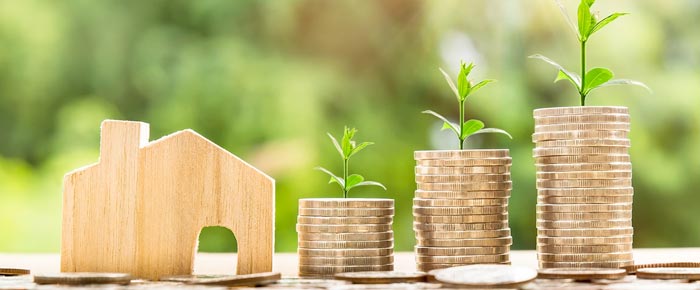Buying property is one of the biggest financial decisions that you will ever make. A home to raise your family in may bring you peace of mind and give you a safe place to raise your family, but unfortunately, these days, buying a home as an investment isn’t always the best idea.
It's commonplace to think of your property as an investment but based on a number of factors your family home is not seen as an investment but rather a liability.
This misconception comes from our grandparents, many of them bought their houses for next to nothing and now own property worth triple the amount that was initially invested. This is because throughout history property values have always risen but these days inflation quickly closes the gap on the profits that you can expect to gain.
Why a house is not always an investment
An investment is meant to be a plan b for your future. A financial safety net to deploy should find yourself in financial trouble or as part of a retirement plan to provide for your future. The benefit of an investment is that you have the ability to sell it when the time arises to make a profit or gain a good return on your investment.
With the real estate market, the way that it is today, you will have very little control over the buying and selling market. This lack of control has a negative effect on your investment. Many people were forced to sell their homes after the collapse of the housing market and lost a lot of money.
If you’re living in the home then the property is seen as even less of an investment, especially if you never plan on selling it. Living in the residence poses even more problems when you decide to sell as you will need to move as well as purchase another property to live in.
Beware of equity stripping
There are other ways to get equity out of your property, although these methods are not completely risk-free. To secure yourself some extra cash you could take out a loan using your property as security. This is a great way to free up some extra cash when you need it, but you will be required to continue to make monthly payments on the loan. If you default on your payments then you risk losing your home.
When the housing market collapsed people found out the hard way as they were left with no equity in their homes. They couldn’t sell their house for a profit and were stuck with monthly payments that they couldn’t afford. This caused many people to lose their homes.
An investment isn’t meant to cost you money
An investment is supposed to make you money, not cost you extra money. A house will end up costing a lot of money for maintenance, repairs and general upkeep. You will also be responsible for making monthly mortgage payments, taxes and your insurance policy. These costs are known as carrying costs and they can add up very quickly – they carry the weight of the investment.
Your house doesn’t generate cash flow
When you invest in stocks or other assets you expect them to generate cash while you are waiting for your investment to grow. In the case of your house, you won’t be generating any form of cash flow and you won’t collect any dividends until you are ready to sell. This poses its own set of problems.
Property values must increase to generate a profit
In our grandparent’s days property was always seen as a good investment because the value of the property was guaranteed to increase as the years went by. After the complete meltdown of the housing market property values are no longer guaranteed to increase. If the market falls again your property could become a major liability.
If you have borrowed money against your property and are behind in your payments then you could be at risk of losing your home not to mention that your credit score would have dropped.
Consider automatic investments
If you want to invest and take a step into the future, there are easier ways. Use an automatic investment order to take a portion of your salary each week and invest it so you stay on track even when life gets distracting. This technique is called cost averaging investment. It involves investing a small amount each week instead of a large amount of money all at once.
Every time you get an increase, increase the amount that you invest each week.
A great way to save money is to put all of your financial obligations on autopilot. Not only will you save money but you can minimise the stress of remembering to pay everything on time and eliminate the chance of missing a payment.
Visit your bank and set up automatic debits on any accounts that you have. The debit can be aligned with your pay date to make sure that there are always funds available in your account when the debit runs.



